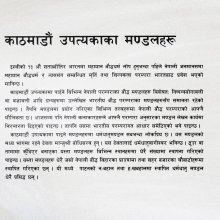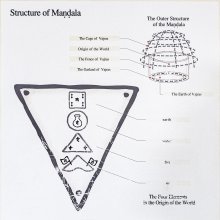Visheshatas, Viśeṣataḥ, Visheshatah, Viśeṣatas: 11 definitions
Introduction:
Visheshatas means something in Hinduism, Sanskrit, Marathi. If you want to know the exact meaning, history, etymology or English translation of this term then check out the descriptions on this page. Add your comment or reference to a book if you want to contribute to this summary article.
The Sanskrit terms Viśeṣataḥ and Viśeṣatas can be transliterated into English as Visesatah or Visheshatah or Visesatas or Visheshatas, using the IAST transliteration scheme (?).
Images (photo gallery)
In Hinduism
Purana and Itihasa (epic history)
Source: archive.org: Shiva Purana - English TranslationViśeṣatas (विशेषतस्) refers to “particularly”, according to the Śivapurāṇa 2.3.4.—Accordingly, as Umā (Durgā/Satī) spoke to the Gods:—“[...] Formerly, O gods, with great devotion Himācala and Menā rendered service to me in my life as Sati, like my parents. Even now they continuously render me service and Menā particularly [i.e., viśeṣatas] (does so). There is no doubt about my becoming their daughter. Just as you, Rudra too, desires my incarnation in the abode of Himavat. Hence I shall incarnate. That shall be the end of misery in the world. [...]”

The Purana (पुराण, purāṇas) refers to Sanskrit literature preserving ancient India’s vast cultural history, including historical legends, religious ceremonies, various arts and sciences. The eighteen mahapuranas total over 400,000 shlokas (metrical couplets) and date to at least several centuries BCE.
Jyotisha (astronomy and astrology)
Source: Wisdom Library: Brihat Samhita by VarahamihiraViśeṣatas (विशेषतस्) means “especially”, according to the Bṛhatsaṃhitā (chapter 9), an encyclopedic Sanskrit work written by Varāhamihira mainly focusing on the science of ancient Indian astronomy astronomy (Jyotiṣa).—Accordingly, “The four constellations from Ārdrā form the second maṇḍala or circle; if Venus should reappear in it, the rainfall will be moderate and the growth of food crops will also be moderate; the Brāhmins will suffer, especially [i.e., viśeṣatas] those who are wicked. If Venus who so reappears in the said circle, should be crossed by a planet, the Mlecchas, forestmen, persons that live by dogs, the hill men of Gomanta and Gonarda, the Cāṇḍālas, the Śūdras and the people of Videha will become wicked and lawless”.

Jyotisha (ज्योतिष, jyotiṣa or jyotish) refers to ‘astronomy’ or “Vedic astrology” and represents the fifth of the six Vedangas (additional sciences to be studied along with the Vedas). Jyotisha concerns itself with the study and prediction of the movements of celestial bodies, in order to calculate the auspicious time for rituals and ceremonies.
Languages of India and abroad
Marathi-English dictionary
Source: DDSA: The Molesworth Marathi and English Dictionaryviśēṣataḥ (विशेषतः).—ad S Particularly, specially, eminently.
Source: DDSA: The Aryabhusan school dictionary, Marathi-Englishviśēṣataḥ (विशेषतः).—ad Specially, eminently, particularly.
Marathi is an Indo-European language having over 70 million native speakers people in (predominantly) Maharashtra India. Marathi, like many other Indo-Aryan languages, evolved from early forms of Prakrit, which itself is a subset of Sanskrit, one of the most ancient languages of the world.
Sanskrit dictionary
Source: DDSA: The practical Sanskrit-English dictionaryViśeṣatas (विशेषतस्).—ind.
1) Especially, particularly.
2) In proportion to; निःस्वेभ्यो देयमेतेभ्यो दानं विद्याविशेषतः (niḥsvebhyo deyametebhyo dānaṃ vidyāviśeṣataḥ) Manusmṛti 11.2.
3) Individually, singly.
See also (synonyms): viśeṣeṇa, viśeṣāt.
Source: Cologne Digital Sanskrit Dictionaries: Shabda-Sagara Sanskrit-English DictionaryViśeṣatas (विशेषतस्).—Ind. Especially, particularly, specifically. E. viśeṣa and tasi aff.
Source: Cologne Digital Sanskrit Dictionaries: Benfey Sanskrit-English DictionaryViśeṣatas (विशेषतस्).—[viśeṣa + tas], adv. Especially, [Hitopadeśa] 80, 1, M.M.; particularly, [Vikramorvaśī, (ed. Bollensen.)] [distich] 62.
Source: Cologne Digital Sanskrit Dictionaries: Cappeller Sanskrit-English DictionaryViśeṣatas (विशेषतस्).—[adverb] according to the difference of (—°); especially, in particular.
Source: Cologne Digital Sanskrit Dictionaries: Monier-Williams Sanskrit-English Dictionary1) Viśeṣatas (विशेषतस्):—[=vi-śeṣa-tas] [from vi-śeṣa > vi-śiṣ] ind. according to the difference of, in proportion to ([compound]), [Manu-smṛti xi, 2]
2) [v.s. ...] especially, particularly, above all, [Manu-smṛti; Mahābhārata] etc.
3) [v.s. ...] individually, singly, Vedāntas.
Source: Cologne Digital Sanskrit Dictionaries: Yates Sanskrit-English DictionaryViśeṣatas (विशेषतस्):—adv. Particularly.
[Sanskrit to German]
Sanskrit, also spelled संस्कृतम् (saṃskṛtam), is an ancient language of India commonly seen as the grandmother of the Indo-European language family (even English!). Closely allied with Prakrit and Pali, Sanskrit is more exhaustive in both grammar and terms and has the most extensive collection of literature in the world, greatly surpassing its sister-languages Greek and Latin.
See also (Relevant definitions)
Partial matches: Vishesha, Tah, Tas.
Ends with: Avisheshatas, Savisheshatas.
Full-text (+15): Savisheshatas, Avisheshatas, Brahmakurca, Nirbandhin, Anukalam, Visheshena, Visheshat, Vibhusana, Sthairyaja, Ajnata, Mahaprasada, Ekabhava, Candrashekhara, Parihartavya, Ashmaka, Cula, Durmanas, Parvakala, Samanya, Dayalu.
Relevant text
Search found 30 books and stories containing Visheshatas, Visesatas, Vishesha-tas, Viśeṣa-tas, Visesa-tas, Viśeṣataḥ, Visheshatah, Viśeṣatas, Viśēṣataḥ, Vishesha-tah, Viśeṣa-taḥ, Viśēṣa-taḥ, Visesa-tah, Visesatah; (plurals include: Visheshatases, Visesatases, tases, Viśeṣataḥs, Visheshatahs, Viśeṣatases, Viśēṣataḥs, tahs, taḥs, Visesatahs). You can also click to the full overview containing English textual excerpts. Below are direct links for the most relevant articles:
Brihad Bhagavatamrita (commentary) (by Śrī Śrīmad Bhaktivedānta Nārāyana Gosvāmī Mahārāja)
Verse 2.1.216 < [Chapter 1 - Vairāgya (renunciation)]
Verse 2.1.214 < [Chapter 1 - Vairāgya (renunciation)]
Verse 2.3.55 < [Chapter 3 - Bhajana (loving service)]
Garga Samhita (English) (by Danavir Goswami)
Verse 4.10.14 < [Chapter 10 - The Story of the Pulindā Women]
Verse 2.23.39 < [Chapter 23 - The Killing of Śaṅkhacūḍa During the Rāsa-dance Pastime]
Verses 6.15.43-44 < [Chapter 15 - The Glories of Nṛga-kūpa and Gopī-bhūmi]
Vaisheshika-sutra with Commentary (by Nandalal Sinha)
Sūtra 4.1.4 (The eternal exists) < [Chapter 1 - Of Atoms]
Sūtra 4.1.5 (The theory that atoms are not eternal, is erroneous) < [Chapter 1 - Of Atoms]
Chaitanya Bhagavata (by Bhumipati Dāsa)
Verse 1.5.28 < [Chapter 5 - Eating the Mendicant Brāhmaṇa’s Offerings]
Bhakti-rasamrta-sindhu (by Śrīla Rūpa Gosvāmī)
Verse 4.4.2 < [Part 4 - Compassion (karuṇa-rasa)]
Verse 2.5.42 < [Part 5 - Permanent Ecstatic Mood (sthāyī-bhāva)]
Verse 1.2.91 < [Part 2 - Devotional Service in Practice (sādhana-bhakti)]


